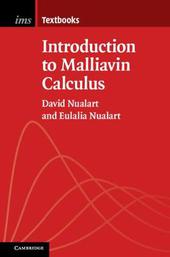
|
Introduction to Malliavin Calculus
Paperback / softback
Main Details
| Title |
Introduction to Malliavin Calculus
|
| Authors and Contributors |
By (author) David Nualart
|
|
By (author) Eulalia Nualart
|
| Series | Institute of Mathematical Statistics Textbooks |
|---|
| Physical Properties |
| Format:Paperback / softback | | Pages:246 | | Dimensions(mm): Height 228,Width 152 |
|
| Category/Genre | Calculus and mathematical analysis |
|---|
| ISBN/Barcode |
9781107611986
|
| Classifications | Dewey:519.23 |
|---|
| Audience | | Postgraduate, Research & Scholarly | |
|---|
|
Publishing Details |
| Publisher |
Cambridge University Press
|
| Imprint |
Cambridge University Press
|
| Publication Date |
27 September 2018 |
| Publication Country |
United Kingdom
|
Description
This textbook offers a compact introductory course on Malliavin calculus, an active and powerful area of research. It covers recent applications, including density formulas, regularity of probability laws, central and non-central limit theorems for Gaussian functionals, convergence of densities and non-central limit theorems for the local time of Brownian motion. The book also includes a self-contained presentation of Brownian motion and stochastic calculus, as well as Levy processes and stochastic calculus for jump processes. Accessible to non-experts, the book can be used by graduate students and researchers to develop their mastery of the core techniques necessary for further study.
Author Biography
David Nualart is the Black-Babcock Distinguished Professor in the Department of Mathematics at the University of Kansas. He has published around 300 scientific articles in the field of probability and stochastic processes, and he is the author of the fundamental monograph The Malliavin Calculus and Related Topics (2005). He has served on the editorial board of leading journals in probability, and from 2006 to 2008 was the editor-in-chief of Electronic Communications in Probability. He was elected Fellow of the Institute of Mathematical Statistics in 1997 and he received the Higuchi Award on Basic Sciences in 2015. Eulalia Nualart is Associate Professor at Universitat Pompeu Fabra, Barcelona and a Barcelona Graduate School of Economics (GSE) Affiliated Professor. She is also the Deputy Director of the Barcelona GSE Master Program in Economics. Her research interests include stochastic analysis, Malliavin calculus, fractional Brownian motion, and Levy processes. She has publications in top journals such as Stochastic Processes and their Applications, Annals of Probability, and the Journal of Functional Analysis. In 2013 she was awarded a Marie Curie Career Integration Grant.
Reviews'This book is a delightful and self-contained introduction to stochastic and Malliavin calculus that will guide the graduate students in probability theory from the basics of the theory to the borders of contemporary research. It is a must read written by two globally recognized experts!' Fabrice Baudoin, University of Connecticut 'Malliavin calculus has seen a great revival of interest in recent years, after the discovery about ten years ago that Stein's method for probabilistic approximation and Malliavin calculus fit together admirably well. Such an interaction has led to some remarkable limit theorems for Gaussian, Poisson and Rademacher functionals. This monograph, written by two internationally renowned specialists of the field, provides a concise, self-contained and very pleasant exposition of different aspects of this rich and recent line of research. For sure, it is destined to quickly become a must-have reference book!' Ivan Nourdin, University of Luxembourg 'The book provides a concise and self-contained exposition of the subject including recent developments.' Maria Gordina, MathSciNet 'The book is written very clearly and precisely, and will be useful to anyone who wants to study the Malliavin calculus and its applications at the introductory level and then more deeply, as well as those who are ready to apply these results in their research. The book can be used to give lectures for graduate students.' Yuliya S. Mishura, zbMath
|